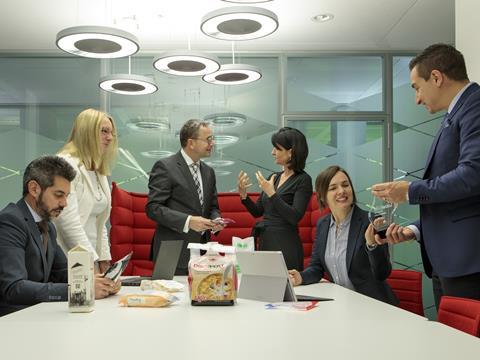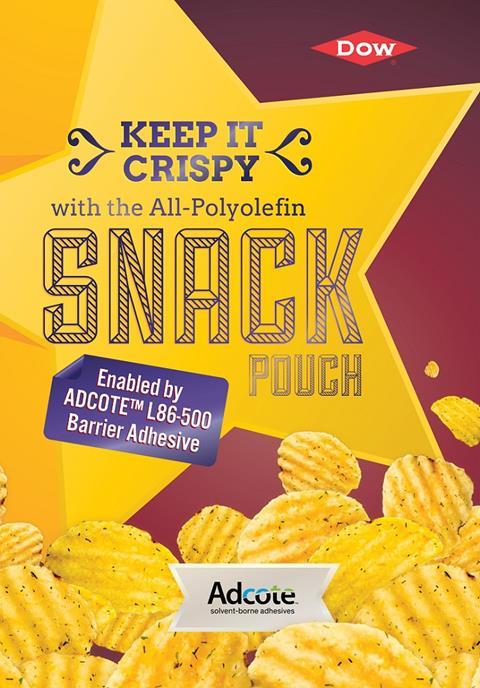
In 2014 Dow made a first appearance at interpack to share with the industry the new approach it had been developing. Returning in 2017, the global business was able to speak in much more concrete terms about its strategic vision of value chain collaboration. Tim Sykes met Javier Constante (VP Packaging & Speciality Plastics EMEA) on the first morning of the fair to assess the extent to which this concept has been realised and to discover how it continues to evolve.
“The Pack Studios process began six years ago. From the beginning we were very clear that the whole value chain needed to be involved in order to achieve the sort of joined-up innovation the market required,” Javier Constante reflected. “This meant we couldn’t bypass converters, although frankly some brand owners would initially have preferred to do so. Each link in the value chain provides its unique expertise and without bringing them all together, there’s no chance of accelerating the process of bringing viable new solutions to market. We had been trying to foster these kinds of collaborations for some time but Pack Studios proved to be the catalyst.”
Thanks to the platform provided by the Pack Studios facilities, boosted by high-profile successes such as the early partnership with Nordmeccanica as well as by good existing relationships with major brand owners, more and more stakeholders began to approach Dow to help facilitate collaborative projects. Often the initial point of contact would be a converter, at marketing director level, who brought a more nuanced understanding of specific needs of brand owners.
![dow_foi_javier_constante-01[1].jpg](https://d2wrwj382xgrci.cloudfront.net/Pictures/480xany/2/7/4/1274_dow_foi_javier_constante-01%5B1%5D.jpg)
Recurrently, this reflected a desire to develop packaging solutions that respond to core pressures on packaging within the narrow requirements of specific market segments. “The central challenge for packaging is perhaps delivering increased sustainability,” remarked Mr Constante. “We need to design the sustainable packaging of the future. For flexible packaging, which sometimes gets a bad press, this particularly means thinking about end of life. So a lot of R&D is going into thinking about making flexible packaging compatible with recycling. However, shelf impact is another major driver. This is also considered through the lens of specific market applications. For instance, in the pet food segment (where of course the human ‘consumer’ rarely tastes the product!) appearance and convenience are key to purchase decisions. We are therefore having long conversations with converters about the kinds of innovations we can introduce that can make a difference.”
The fruits of such efforts were there for all to see at interpack 2017, where the shift from talking about collaboration in 2014 to presenting a range of solutions born in Pack Studios illustrated the exponential growth of the project.
Perhaps the most significant of these was the ADCOTETM L86-500 Barrier Adhesive – a key enabler of the all-polyolefin package. Designed for medium barrier applications, it provides additional protection against oxygen and moisture. The adhesive enables the development of a packaging that is recyclable in standard schemes, while replicating the shelf-life performance of PET-based packaging. All-polyolefin packages enabled by this new adhesive were showcased at interpack for aroma- and barrier-sensitive applications, including a coffee pouch produced in collaboration with Bosch and Mondi, as well as cereal pouches, snack and dry pet food packs and wet wipe packages.
Other products featured in Dow’s interpack ‘Boutique’ included INNATE™ the result of an agile collaboration with ITP, enabling high abuse resistance for tough frozen food applications, and EasySplit, a separable carton/film concept deriving from a partnership with B-Pack. Meanwhile, Dow took the opportunity of the interpack stage to announce a global Pack Studios collaboration programme with HP Indigo to accelerate innovation in flexible packaging. The programme will accelerate flexible packaging development through shared resources to understand final package appearance and shelf appeal. The collaboration grants HP Indigo access to the Dow Pack Studios network and technical facilities, while simultaneously expanding Pack Studios’ capabilities through access to HP’s digital-printing resources and expertise.

While the kind of collaboration Dow has pioneered and refined since interpack 2014 benefits the whole value chain, the commercial advantages are clear.
“The idea of a company like Dow selling solutions rather than raw material by the kilo was a foreign idea ten years ago,” Mr Constante remarked. “However, the market is far more receptive to the idea today. This is of course reinforced by external market pressures such as the need to reduce packaging materials.”
Despite this significant progress, however, the collaborative adventure can still be regarded as a work in progress. Mr Constante concluded by hinting at shift in direction that could make for radically different results by 2020:
“Collaborative innovation is a continuing journey. Our approach is evolving as we learn about both the possibilities and the barriers. For instance, we have found that small scale projects and prototyping can be problematic for brand owners. It can be an obstacle to getting large brand owners on board. Therefore, as a next step we intend to work more with co-packers, who are in a position to create the bridge between prototyping and large scale production.”










